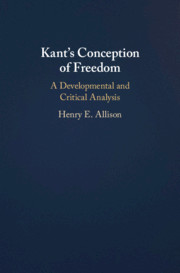Book contents
- Kant’s Conception of Freedom
- Kant’s Conception of Freedom
- Copyright page
- Dedication
- Contents
- Preface
- Acknowledgments
- Note on Sources and Key to Abbreviations and Translations
- 1 Kant’s Writings of the 1750s and the Place in Them of the Free Will Issue
- 2 Kant’s Theoretical Philosophy in the Early 1760s and Its Relation to His Conception of Freedom
- 3 Kant’s Moral Philosophy in the Early 1760s
- 4 Kant’s Dialogue with Rousseau Supplemented by His Dreams of a Spirit-Seer
- 5 From the “Great Light” to the “Silent Decade”: Kant’s Thoughts on Free Will 1769–1780
- 6 Kant’s Account of Free Will in the Critique of Pure Reason
- 7 From the Critique of Pure Reason to the Groundwork
- 8 The Fact of Reason and Freedom in the Critique of Practical Reason
- 9 The Critique of the Power of Judgment and the Transition from Nature to Freedom
- 10 Kant’s Final Thoughts on Free Will
- Bibliography
- Index
2 - Kant’s Theoretical Philosophy in the Early 1760s and Its Relation to His Conception of Freedom
Published online by Cambridge University Press: 19 December 2019
- Kant’s Conception of Freedom
- Kant’s Conception of Freedom
- Copyright page
- Dedication
- Contents
- Preface
- Acknowledgments
- Note on Sources and Key to Abbreviations and Translations
- 1 Kant’s Writings of the 1750s and the Place in Them of the Free Will Issue
- 2 Kant’s Theoretical Philosophy in the Early 1760s and Its Relation to His Conception of Freedom
- 3 Kant’s Moral Philosophy in the Early 1760s
- 4 Kant’s Dialogue with Rousseau Supplemented by His Dreams of a Spirit-Seer
- 5 From the “Great Light” to the “Silent Decade”: Kant’s Thoughts on Free Will 1769–1780
- 6 Kant’s Account of Free Will in the Critique of Pure Reason
- 7 From the Critique of Pure Reason to the Groundwork
- 8 The Fact of Reason and Freedom in the Critique of Practical Reason
- 9 The Critique of the Power of Judgment and the Transition from Nature to Freedom
- 10 Kant’s Final Thoughts on Free Will
- Bibliography
- Index
Summary
Since Kant’s discussions of free will in the texts from the first half of the 1760s are contained in his contributions to both theoretical and practical philosophy, and since these involve different considerations, it will be convenient to divide the treatment of Kant’s account of freedom during this period into two chapters. The present chapter will be concerned with Kant’s theoretical writings, insofar as they bear on the issue, and it will focus on the following texts: “Inquiry concerning the distinctness of the principles of natural theology and morality, being an answer to the question proposed by the Berlin Royal Academy of Sciences for the year 1763” [Untersuchung über die Deutlichkeit der Grundsätze der natürlichen Theologie und der Moral. Zur Beantwortung der Frage, welche die Konig. Akademie der Wissenschaften zu Berlin auf das Jahr 1763 aufgegeben hat] (1764) (henceforth referred to as the Prize Essay); “An attempt to introduce the concept of negative magnitudes into philosophy” [Versuch den Begriff der negativen Grössen in die Weltweisheit einzufuhren] (1763) (henceforth referred to as Negative Magnitudes); The Only Possible Argument in Support of a Demonstration of the Existence of God [Der einzig mögliche Beweisgrund zu einer Demonstration des Daseins Gottes] (1763) (henceforth referred to as Beweisgrund); and the portion of Herder’s transcript of Kant’s metaphysics lectures that deals with freedom of the will.
- Type
- Chapter
- Information
- Kant's Conception of FreedomA Developmental and Critical Analysis, pp. 45 - 84Publisher: Cambridge University PressPrint publication year: 2020



